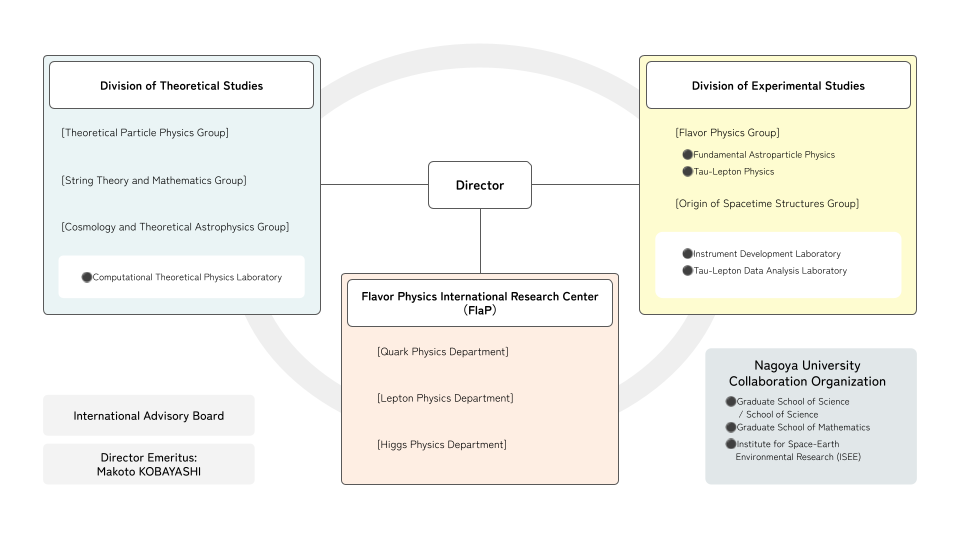
Senior Leadership
| Director | IIJIMA Toru |
|---|---|
| Director Emeritus | KOBAYASHI Makoto |
| Chair for division of Theoretical Studies | SHIROMIZU Tetsuya |
| Chair for division of Experimental Studies | ITOW Yoshitaka |
| Chair for International Flavor Physics Center (FlaP) | IIJIMA Toru |
| Chief for Computational Theoretical Physics Laboratory | ICHIKI Kiyotomo |
| Chief for Instrument Development Laboratory | NAKANO Toshiyuki |
| Chief for Tau-Lepton Data Analytics Laboratory | IIJIMA Toru |
| Chief for Public Relations office | MIYATAKE Hironao |
| Deputy chief for Public Relations office | KAZAMA Shingo |
Advisory Board
- John Ellis (Professor, King’s College London)
- Satoshi Iso (Professor, High Energy Accelerator Research Organization (KEK))
- Takaaki Kajita (Director, Institute for Cosmic Ray Research, The University of Tokyo)
- Hitoshi Murayama (Professor, University of California, Berkeley)
- Misao Sasaki (Professor, Kavli Institute for the Physics and Mathematics of the Universe, The University of Tokyo)
- Joseph Silk (Professor, Institut d’astrophysique de Paris)
- Shoji Asai (Director General, High Energy Accelerator Research Organization (KEK))
(in alphabetical order, as of May, 2022)
International Partner Institutions
- School of Physics and Astronomy, Tel Aviv University | Israel
- Institute of Physics and Applied Physics (IPAP), Yonsei University | Korea
- Jozef Stefan Institute | Slovenia
- Higgs Centre for Theoretical Physics, University of Edinburgh | UK
- Institute of Space Studies of Catalonia (IEEC) | Spain
- Institute of Theoretical Physics, The Chinese Academy of Sciences | China
- National Institute for Nuclear Physics, Padova Division | Italy
- The University of Naples Federico II, Department of Physics Ettore Pancini | Italy
JSPS Core-to-core Program
The Core-to-Core program is designed to create top world-class research centers that partner over the long term with other core research institutions around the world in advancing research in leading-edge fields on issues of high international priority.
The KMI’s project — International research network to reveal dark matter in the universe by multidisciplinary approach in particle and astrophysics — starts in FY 2020 and continues until FY 2024 in collaboration with four countries: Japan, Germany, Italy, UK, and Korea. Professor Junji Hisano from KMI joins the project as the coordinater of Japan. The Counterpart core institutions are Max Planck Institute for Nuclear Physics, National Institute for Nuclear Physics/Padova Division, University of Edinburgh, and Institute for Basic Science. In addition to those core institutes, many researchers from other domestic and foreign institutes are involved in the project. Through the project, KMI will improve the study of the dark universe.




